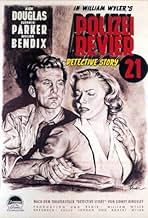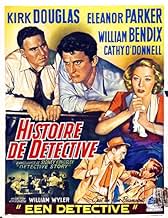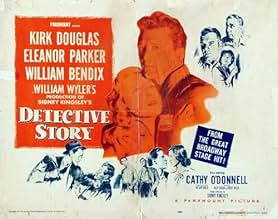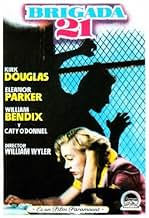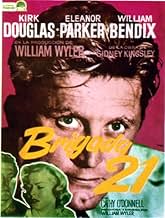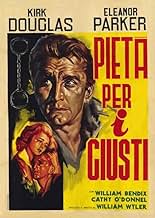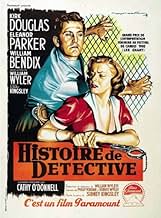VALUTAZIONE IMDb
7,5/10
9953
LA TUA VALUTAZIONE
Un giorno nella vita della squadra di detective del 21 ° distretto di New York. Mostra la loro routine quotidiana, i problemi che devono affrontare, dalle piccole lamentele dei cittadini ai ... Leggi tuttoUn giorno nella vita della squadra di detective del 21 ° distretto di New York. Mostra la loro routine quotidiana, i problemi che devono affrontare, dalle piccole lamentele dei cittadini ai crimini.Un giorno nella vita della squadra di detective del 21 ° distretto di New York. Mostra la loro routine quotidiana, i problemi che devono affrontare, dalle piccole lamentele dei cittadini ai crimini.
- Regia
- Sceneggiatura
- Star
- Candidato a 4 Oscar
- 7 vittorie e 11 candidature totali
William 'Bill' Phillips
- Det. Pat Callahan
- (as William 'Bill' Phillips)
Recensioni in evidenza
William Wyler, who won three Oscars for Best Director ("Mrs. Miniver", "The Best Years of Our Lives", "Ben-Hur"), and been nominated a record 12 times between 1937 and 1966, is not often thought of as one of our "great" directors. Truly, he was. Here, with the filmization of Sidney Kingsley's stage play about a NYC police station, focusing on the amazingly bad day which has been happening to Detective Kirk Douglas, Wyler shows his skill and diversity.
Kirk Douglas is the vision of a crumbling spirit disguised by toughness and authority. He towers over a stellar cast, including Eleanor Parker as his wife, William Bendix as one of the other officers in the precinct, and Lee Grant as an inexperienced shoplifter. The one actor who truly stands out from the rest is Joseph Wiseman, who is simply a spark plug made up as an actor, giving an astounding recreation of his stage role as an on-edge, cheap suit-wearing thief. He displays the physical dexterity of James Cagney in the physique of a beanstalk, and proves to be more dangerous than any other movie crook we'd seen in the past.
In one of the great Oscar follies of our time (and there were many), the 1952 voters neglected to nominate Douglas as Best Actor, or Wiseman in a supporting slot. Nominations were given out for Wyler's direction, the screenplay, and for Parker and Grant, lead and supporting actresses respectively. None for Best Picture, the other nominations were passed over in favor of "A Place in the Sun" and "A Streetcar Named Desire". And who was picked for Best Picture? Well, staying true to AMPAS's mission of picking only the most harmless movie of the year ("Driving Miss Daisy", "Chariots of Fire", "Shakespeare in Love"), instead of the best, they picked "An American in Paris", which will be remembered by film historians as merely a rehearsal for "Singin' in the Rain". Oh, well.
Kirk Douglas is the vision of a crumbling spirit disguised by toughness and authority. He towers over a stellar cast, including Eleanor Parker as his wife, William Bendix as one of the other officers in the precinct, and Lee Grant as an inexperienced shoplifter. The one actor who truly stands out from the rest is Joseph Wiseman, who is simply a spark plug made up as an actor, giving an astounding recreation of his stage role as an on-edge, cheap suit-wearing thief. He displays the physical dexterity of James Cagney in the physique of a beanstalk, and proves to be more dangerous than any other movie crook we'd seen in the past.
In one of the great Oscar follies of our time (and there were many), the 1952 voters neglected to nominate Douglas as Best Actor, or Wiseman in a supporting slot. Nominations were given out for Wyler's direction, the screenplay, and for Parker and Grant, lead and supporting actresses respectively. None for Best Picture, the other nominations were passed over in favor of "A Place in the Sun" and "A Streetcar Named Desire". And who was picked for Best Picture? Well, staying true to AMPAS's mission of picking only the most harmless movie of the year ("Driving Miss Daisy", "Chariots of Fire", "Shakespeare in Love"), instead of the best, they picked "An American in Paris", which will be remembered by film historians as merely a rehearsal for "Singin' in the Rain". Oh, well.
Adapted from a stage play by Sidney Kingsley, "Detective Story" depicts a day at a New York police precinct in the early 1950's. The film resembles a feature-length episode of "Barney Miller" without the jokes as the detectives bring various shoplifters, petty thieves, and embezzlers into the station for booking. However, the film does not lack humor as a broad hammy performance by Joseph Wiseman and an only slightly subtler take on a Brooklynese shoplifter by Lee Grant lighten up the often heavily dramatic proceedings.
The central character, Detective Jim McLeod, is an unforgiving, by-the-book veteran, who sees the world in black and white, good versus evil, with no shades of gray in between. Kirk Douglas brings McLeod to life in one of his finest, most powerful performances. Douglas's Oscar-caliber work is matched by a fragile, deeply felt performance by Eleanor Parker as McLeod's wife, who harbors a secret from her past that, unknown to either McLeod or his wife, connects back to an on-going police case. The scenes between Douglas and Parker are among the best in the film.
Veteran director William Wyler retains most of the play's action in the central precinct room and only occasionally breaks from the claustrophobic set for a breather. Lee Garmes photographed "Detective Story" in crisp black and white, and some of the shots of New York City could be framed and hung on a wall. With a cast of top character players that includes Gladys George, William Bendix, Frank Faylen, and George Macready, the multi-character, multi-plotted "Detective Story" is a powerful, well-acted film that somehow is less often seen than its quality warrants.
The central character, Detective Jim McLeod, is an unforgiving, by-the-book veteran, who sees the world in black and white, good versus evil, with no shades of gray in between. Kirk Douglas brings McLeod to life in one of his finest, most powerful performances. Douglas's Oscar-caliber work is matched by a fragile, deeply felt performance by Eleanor Parker as McLeod's wife, who harbors a secret from her past that, unknown to either McLeod or his wife, connects back to an on-going police case. The scenes between Douglas and Parker are among the best in the film.
Veteran director William Wyler retains most of the play's action in the central precinct room and only occasionally breaks from the claustrophobic set for a breather. Lee Garmes photographed "Detective Story" in crisp black and white, and some of the shots of New York City could be framed and hung on a wall. With a cast of top character players that includes Gladys George, William Bendix, Frank Faylen, and George Macready, the multi-character, multi-plotted "Detective Story" is a powerful, well-acted film that somehow is less often seen than its quality warrants.
Detective Story (1951)
**** (out of 4)
William Wyler's brilliant drama about a police detective (Kirk Douglas) who breaks his back trying to put criminals behind bars but there's a secret from his wife that's going to toss all his beliefs in the air. The last time I watched this film was when I was around eleven years old and it left a vivid aftertaste in my mouth after all these years. At the time I was just expecting another "old, dated" film but the realistic nature of this film remains quite powerful and very brutal even in today's jaded world. The entire cast delivers strong performances from the lead Douglas to the smallest of parts in the film. These performances certainly help the film seem all the more real, which is an added bonus. The best performance is of course the one by Douglas who brings all that energy and power to the film. Watching his character slowly breakdown and eventually lose it is something hard to forget.
**** (out of 4)
William Wyler's brilliant drama about a police detective (Kirk Douglas) who breaks his back trying to put criminals behind bars but there's a secret from his wife that's going to toss all his beliefs in the air. The last time I watched this film was when I was around eleven years old and it left a vivid aftertaste in my mouth after all these years. At the time I was just expecting another "old, dated" film but the realistic nature of this film remains quite powerful and very brutal even in today's jaded world. The entire cast delivers strong performances from the lead Douglas to the smallest of parts in the film. These performances certainly help the film seem all the more real, which is an added bonus. The best performance is of course the one by Douglas who brings all that energy and power to the film. Watching his character slowly breakdown and eventually lose it is something hard to forget.
A play which tells the story of a day in the lives of the several people who populate a police precinct translates more or less transparently between mediums, though with its theatrical pace results in a vigorous, enthralling drama with a solid, receptive cast. Kirk Douglas, playing the central cop, a brooding maverick who can't stand having to stop at the line between law and vengeance, is very intense in particular, the breadth of view of a crystallizing soul masqueraded by rigor and command, which makes for some delicate scenes with his wife, Eleanor Parker. The very natural William Bendix is one of the other officers in the precinct, a cop with a delicate sensibility, the clear contrast to the uncompromising protagonist. But the film's brightest highlights are the few moments dominated by the brilliant Lee Grant, whose character seems non-sequitary yet has a refreshing outside-world quality. Dense with lively exhibitions of the sort of devil-may-care influx that transits and languishes through a workday of plainclothes detectives, it is a police procedural not in the traditional sense. There is no central case over which our detectives toil. There is simply an allotment of arrests and conflicting views on the confines of police work.
While this Edgar-winning cop drama stays in effect a filmed play, William Wyler uses the innate limitations of such a project as a creative outlet, as well as his widely known grating approach multiple retakes. The cooped up setting is not just a space where all manner of characters eyeball each other and interplay. It complements the lurking gist of the story's thematic elements and overall to the film's dramatic impact. The staging of the individual scenes, which a lot of the time plays on foreground-background relationships, is intensified by Lee Garmes's deep-focus cinematography, a consistent device used by Wyler throughout his body of work no matter how much he diversifies in genre and tone.
The core of Wyler's consistency throughout his tremendous career is his insistence on emotional truth, thus his enraging approach to directing actors, and thus his track record with directing Oscar-nominated and Oscar-winning performances. Wyler's discretion of angle exposes or intimates more character than the last and apprehends the decisive sensibility to give significance to the experience of seeing the film. He didn't coin anything new. He didn't use unprecedented angles or logistically fussy dolly takes. He's discerning from the acknowledged bill of fare of long shot, medium shot and close-up as the atmosphere of the scene calls for.
While this Edgar-winning cop drama stays in effect a filmed play, William Wyler uses the innate limitations of such a project as a creative outlet, as well as his widely known grating approach multiple retakes. The cooped up setting is not just a space where all manner of characters eyeball each other and interplay. It complements the lurking gist of the story's thematic elements and overall to the film's dramatic impact. The staging of the individual scenes, which a lot of the time plays on foreground-background relationships, is intensified by Lee Garmes's deep-focus cinematography, a consistent device used by Wyler throughout his body of work no matter how much he diversifies in genre and tone.
The core of Wyler's consistency throughout his tremendous career is his insistence on emotional truth, thus his enraging approach to directing actors, and thus his track record with directing Oscar-nominated and Oscar-winning performances. Wyler's discretion of angle exposes or intimates more character than the last and apprehends the decisive sensibility to give significance to the experience of seeing the film. He didn't coin anything new. He didn't use unprecedented angles or logistically fussy dolly takes. He's discerning from the acknowledged bill of fare of long shot, medium shot and close-up as the atmosphere of the scene calls for.
In one day in the 21st Precinct of New York, many criminals are booked after being arrested: a shoplifter is brought after stealing a purse in a department store; two burglars with extensive criminal record are captured by a policeman burgling an apartment; the small time embezzler Arthur Kindred (Craig Hill), who is primary, is arrested without any resistance. The tough Detective McLeod (Kirk Douglas), who loves his wife Mary (Eleanor Parker), is an honest detective with strong principles and code of honor and zero tolerance. He is near to conclude a case against an abortionist, Dr. Karl Schneider (George Macready), with the testimony of a witness that is coming to identify Dr. Schneider in the precinct. However, the woman is bribed and the upset McLeod hits Schneider, and he insinuates to McLeod's chief, Lt. Monaghan (Horace McMahon), that the problem is personal and gives the name of Mary McLeod. Lt. Monaghan invites Mary to come to his office for investigation, when deep innermost secrets of her past are disclosed leading to a tragedy.
"Detective Story" is amazingly intense and full of emotions in spite of being shot practically in only one scenario in the interior of the precinct. Kirk Douglas gives an outstanding performance, developing a complex character that sees his principles destroyed in a couple of hours with a great intensity. Eleanor Parker is also fantastic, in the dramatic and heartbreaking role of Mary McLeod. The direction of William Wyler is perfect as usual. My vote is eight.
Title (Brazil): "Chaga de Fogo" ("Sore of Fire")
"Detective Story" is amazingly intense and full of emotions in spite of being shot practically in only one scenario in the interior of the precinct. Kirk Douglas gives an outstanding performance, developing a complex character that sees his principles destroyed in a couple of hours with a great intensity. Eleanor Parker is also fantastic, in the dramatic and heartbreaking role of Mary McLeod. The direction of William Wyler is perfect as usual. My vote is eight.
Title (Brazil): "Chaga de Fogo" ("Sore of Fire")
Lo sapevi?
- BlooperIn some of the close-up shots of McLeod and Schneider in the back of the paddy wagon, McLeod's shadow can be faintly seen on the rear-projection screen showing the street behind them. (Other shadows can also be seen.)
- Citazioni
Detective James McLeod: I built my whole life on hating my father. All the time he was inside me, laughing.
- ConnessioniFeatured in Paramount Presents (1974)
I più visti
Accedi per valutare e creare un elenco di titoli salvati per ottenere consigli personalizzati
- How long is Detective Story?Powered by Alexa
Dettagli
- Tempo di esecuzione1 ora 43 minuti
- Colore
- Proporzioni
- 1.37 : 1
Contribuisci a questa pagina
Suggerisci una modifica o aggiungi i contenuti mancanti

Divario superiore
By what name was Pietà per i giusti (1951) officially released in India in English?
Rispondi

